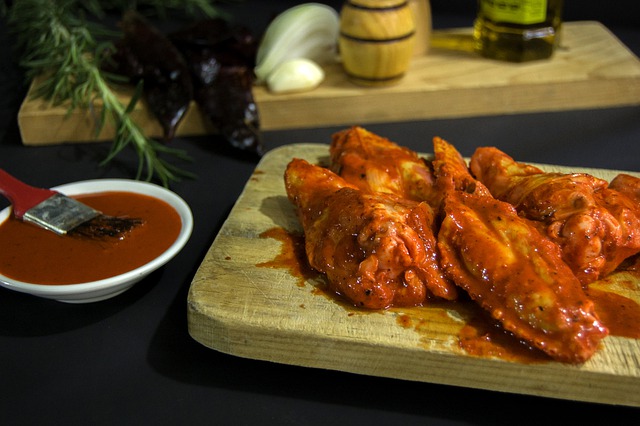
Marinating chicken is a popular cooking technique for many. But, does marinating chicken add calories?
If so, how much? And what ingredients actually do the most damage when marinating my favorite protein?
The quick answer is yes, marinating chicken can add calories. However, the number of calories that can be added depends on the ingredients of the marinade.
First, we will look at a simple marinade of olive oil and balsamic vinegar. One tablespoon of each is about 122 calories total with 100 calories from fat, so this marinade adds an additional 22 calories to our dish.
Second, let’s take a look at the popular honey soy marinade. This marinade is made of soy sauce (79 calories per tablespoon), and honey (74 calories per tablespoon). This adds 155 extra calories to our already 176 calorie chicken breast.
Finally, for our last marinade example, we will look at a sweeter version-teriyaki. This marinade is made up of soy sauce again-but this time we add in brown sugar (54 calories per tablespoon), and ginger (22 calories per teaspoon). One tablespoon of this marinade adds 88 extra calories to our dish.
Source: USDA
So if you are looking for a lower calorie option, I recommend sticking to simple oil and vinegar or maybe soy sauce and a bit of honey.
But remember that moderation is key here. Even though these marinades are low-calorie, you still don’t want to overdo it.
The best way to keep a healthy lifestyle and remain active is by eating small portions of food that allow you to enjoy your meal.
Does marinating chicken make it unhealthy?
The truth is, marinating chicken can have negative effects on your health if you are not careful. By adding ingredients to your chicken, it changes the taste and consistency of the meat.
This alters the way our bodies digest these proteins. Some common issues that come up include disrupting healthy bacteria in our gut, blocking enzymes that help us break down foods, and overloading our bodies with sodium.
However, these negative effects can be reduced if you are careful with your ingredients. For example, if you used the soy sauce and honey marinade to flavor your chicken-which is already high in sodium-you should not add any additional salt to your dish.
The same goes for oil and vinegar. So by using low-calorie, low sodium marinades we can still make our chicken taste great without putting our health at risk!
Benefits of marinating chicken
Now that we have talked a little bit about what marinades to avoid, let’s talk about the benefits of keeping it simple.
When you marinate chicken, you’re not actually “cooking” your meat in the marinade. In most cases, these liquids are used for flavor and then drained or thrown away before actually cooking your protein.
So why marinate at all?
The main reason to marinade is to add more flavor and make a delicious meal. In addition, marinating chicken for 12-24 hours before cooking can help break down the proteins in the meat which helps it become more tender when cooked.
So if you want to add a little flavor-but not too much-to your chicken, marinades are the way to go.
I recommend using a marinade that is no more than 50-100 calories per tablespoon. This can provide you with some added flavor, but still keep your calorie count low.
Can you marinate chicken in coconut milk?
Now many people like to add coconut milk to their marinades and stews. Unfortunately, this is not a good option for marinating chicken because it adds an unnecessary amount of fat and calories that will definitely outweigh the benefits.
One cup of coconut milk has 559 total calories and 53 grams of fat! This would be adding over 500 calories to our already 227 calorie chicken breast.
So while coconut milk might be good for certain dishes-like stir fry or curry-we recommend avoiding it when marinating your protein.
Satisfy your cravings with healthy options If you are looking for a way to satisfy your food cravings without going overboard on calories, look no further than marinades.
Marinating meats in different sauces and liquids is a great way to add some flavor, but not too many calories. Try using a marinade with no more than 50-100 calories per tablespoon, or try making your own with vinegar, oil, salt, and pepper for a tasty treat.
This will help you stay on track with your healthy lifestyle without compromising taste.
What is the best marinade for keeping calories low?
By examining the nutritional facts of these marinades, I find that oil and vinegar have 40 calories per tablespoon while honey mustard has 45. This is a negligible difference but if you are watching your calorie intake every day, this can add up.
So by using oil and vinegar as your marinade it can give you the best taste with a total of 40 calories for your entire dish.
The marinade is the liquid used to add flavor and moisture while cooking meat. If done correctly, a simple marinade can add a delicious flavor while keeping your calorie count low.
When choosing a marinade, look for one that has less than 50-100 calories per tablespoon and does not contain any added oils or sugars.
Conclusion
Marinating chicken can add a delicious flavor to your meal that will satisfy your cravings without compromising your diet.
If you are watching what you eat, try using a marinade with no more than 50-100 calories per tablespoon and see how enjoyable eating healthy can be!
By following these simple tips, marinating can remain flavorful while staying low-calorie and helping you reach your goals.
Marinades make it easy to add flavor to the chicken while keeping the calorie count low.
I hope this is helpful to you. Thank you very much for reading.
If you have more questions about marinating, feel free to visit my guide here.
